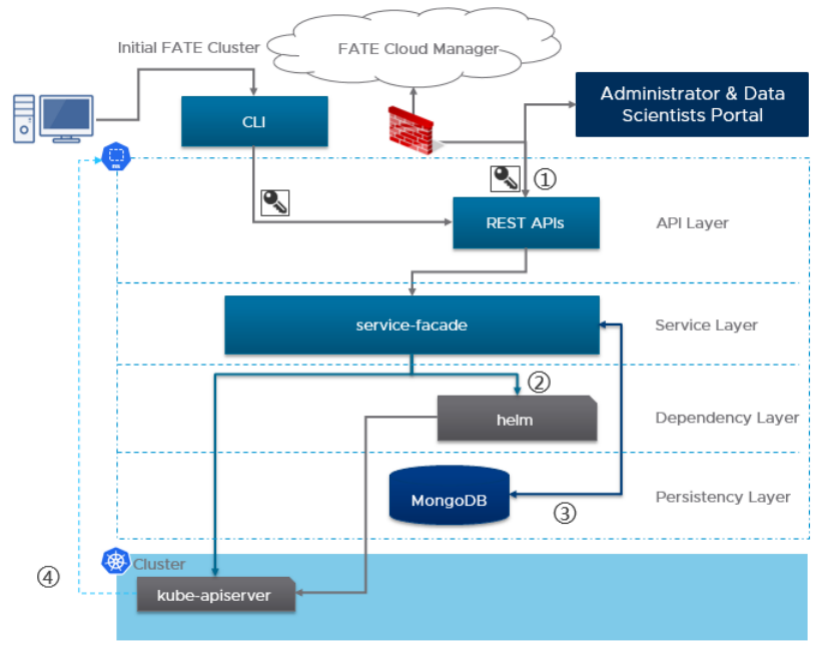Good news of fight against coronavirus outbreak keeps coming. Data protection is on the topic. As the human body needs to improve the immune ability against the potential threat of viruses. How can enterprise and individual user improve their “data immunity” and enhance their data security and defense ability in industrial applications and cooperation? Federated learning is known by the industries. Under the premise of data security and regulation, Federated learning help all industries to train AI. As the first industry-grade open-source framework, FATE (Federated AI Technology Enabler) support homomorphic encryption and MPC computation protocols, and federated learning framework. It contains various machine learning algorithms. You will meet FATE in the field of federated learning.
In 2020 years, FATE released the first version – FATE v1.3. In this version, FATE adds the federated recommendation module – FederatedRec. It implements six popular recommendation algorithms under the federated learning setting, including five heterogeneous federated learning algorithms and one homogeneous federated learning. Besides, KubeFATE has updated greatly and reconstructed. It supports the online inference of FATE-Serving. As for the FederatedML and other modules, the latest version of FATE also updates and improves itself to have a better user experience.
Please go to our GitHub and check it: https://github.com/FederatedAI/FATE
FederatedRec: Support various recommendation scenarios, improve product distribution efficiency and user experience.
In FATE version 1.3, FATE adds the FederatedRec module. It contains six popular recommendation algorithms under the federated learning setting:
* Add federated recommendation submodule
* Add heterogeneous Factorization Machine
* Add homogeneous Factorization Machine
* Add heterogeneous Matrix Factorization
* Add heterogeneous Singular Value Decomposition
* Add heterogeneous SVD++ (Factorization Meets the Neighborhood)
* Add heterogeneous Generalized Matrix Factorization
Hetero FM and Homo FM are the FM (Factorization Machine) algorithm under the vertically and horizontally federated learning settings respectively. They can build FM model with high-order feature iterations among data from different parties. Hetero MF, Hetero SVD, Hetero SVD+ +, and Hetero GMF provide collaborative filtering algorithms under the federated learning setting. They support matrix decomposition in user-item, user-user, and item-item matrices of multiple data parties.
KubeFATE:The latest release of KubeFATE brings in online federated inference with FATE-Serving and smoother user experience
KubeFATE has updated to v1.3.0, to support FATE-Serving which empowers online inference as well as FATE v1.3.0.
Besides, KubeFATE made a complete refactoring in this release for better user experience:
- Full lifecycle management of FATE clusters, including deploying, cleaning, updating, etc.;
- New job frameworks for cluster management, which can be used to trace and identify problems of infrastructure;
- Decouple KubeFATE and the configuration of the FATE cluster. In the future, upgrading FATE can be done by just specifying a new version in YAML and redeploying it, or downloading the tgz package in KubeFATE release page and uploading it to KubeFATE service;
- More flexible modular deployment for FATE, which is effective in users’ complex IT environment.
Finally, from this release, KubeFATE deploys a service, which exposes a RESTful API for cluster management, as well as a command line tool. The RESTful API is easy to be extended and integrated into existing cloud management system. The architecture of KubeFATE is shown in the below figure:

FederatedML: Improve the efficiency of training sparse data. Re-optimized memory consumption
In addition to the updates of FederatedREC and KubeFATE, FederatedML has also been further improved in the latest version. Firstly, sparse format data has been supported in hetero-federated general linear model (GLM, which includes hetero-LR, hetero-LinR and hetero-PoissonR). When training data that suitable for the sparse format, the efficiency can be obviously increased and the memory consumption can be significantly decreased. In addition, solving the 32M limitation problem also enables federated feature binning support higher-dimension and more sample data.
In general, the functionality and practical value of FATE will be more obvious in version 1.3. The FederatedRec module can support various recommendation scenarios, and improve product distribution efficiency and user experience. It also addresses the data insufficiency and labels shortage problems of companies. KubeFATE also explores the production environment, especially in optimizing the management functions update of cloud native environment. In the future, we will cooperate with VMware to publish a multi-party management program based on FATE.
You are welcome to contribute code, submit issues or pull requests. More information about contributor program, please visit our website: https://fate.fedai.org/contribute/
If you have any questions, please leave your comments and add our WeChat: FATEZS001.